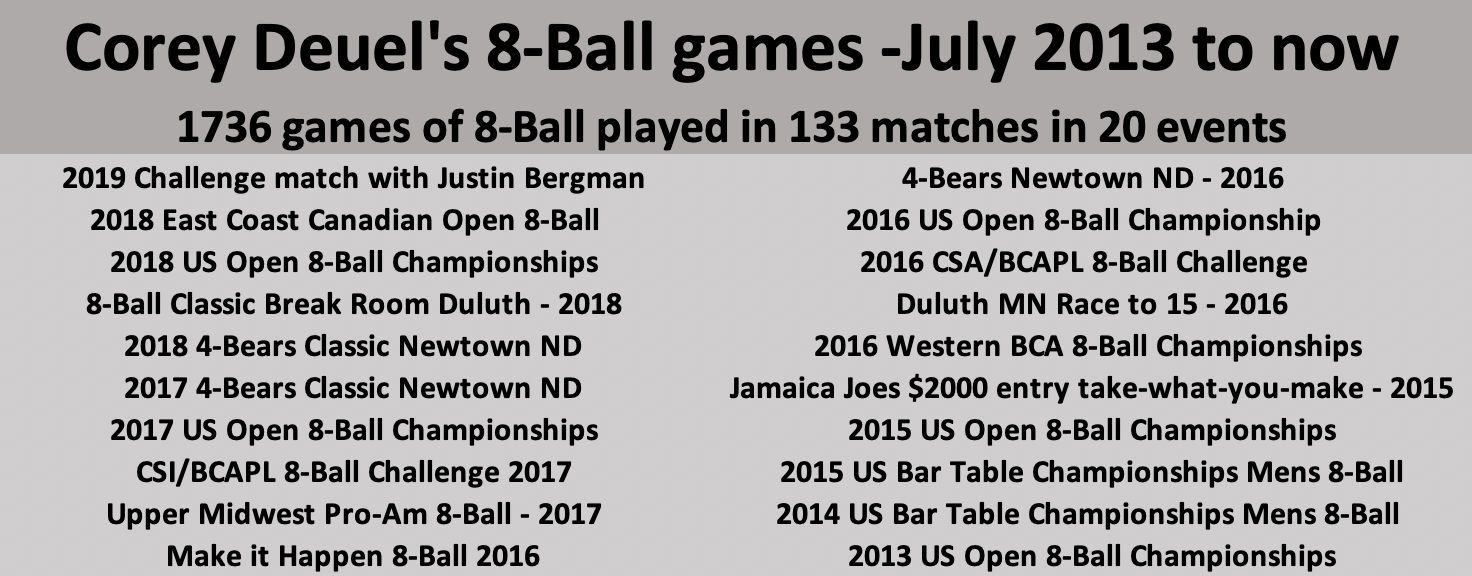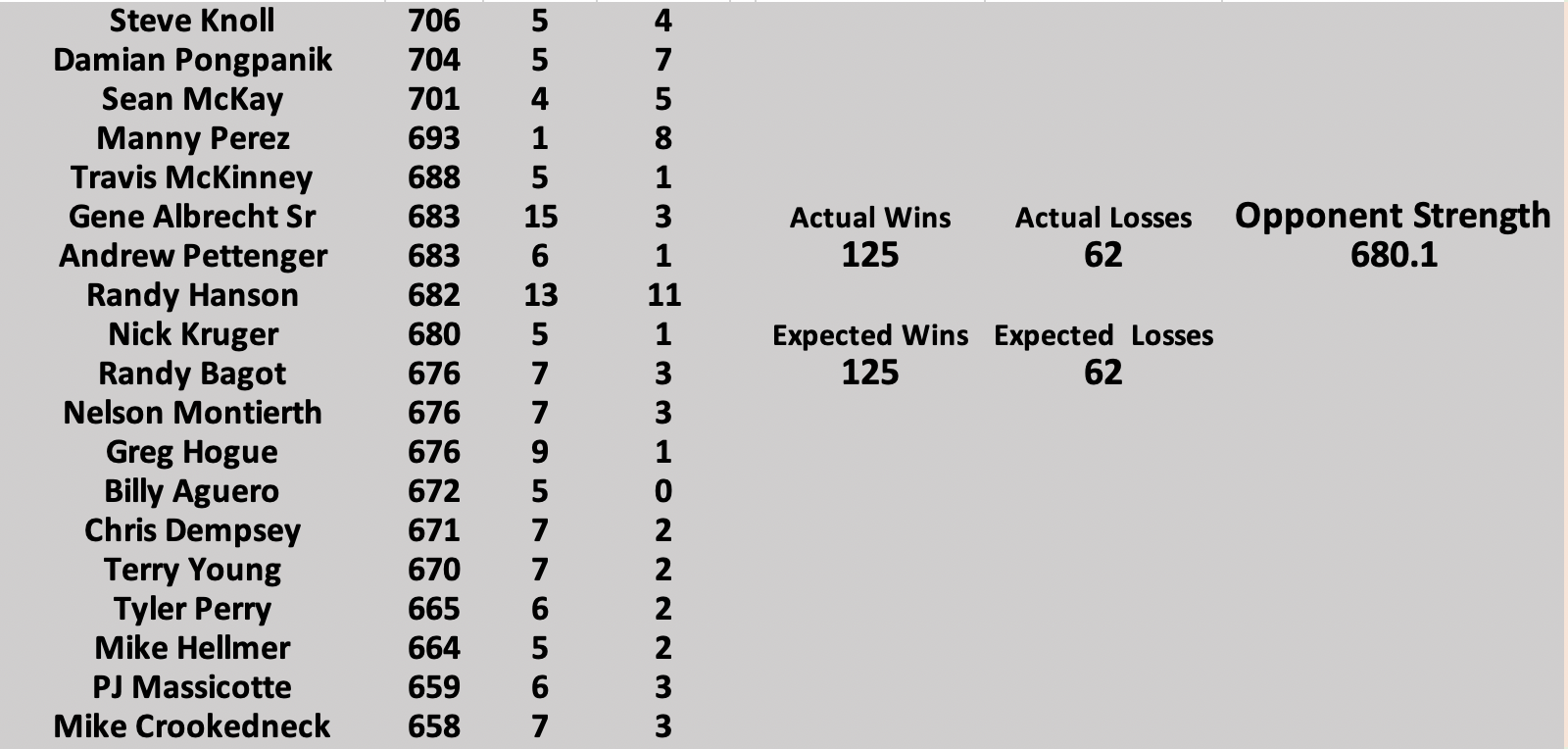- It’s cold in Fargo
- Selfie with a Jaguar on the wrong side of a zoo barrier is a bad idea
- Corey Deuel is good at 8-Ball
In a nobody-disagrees-with-this list, these statements rank high.
But is Corey Deuel’s Fargo Rating of 782—which is determined from 8-Ball, 9-Ball, and 10-Ball games combined—really reflective of his 8-Ball play? Aren’t some people way better at 8-Ball? And aren’t other people way better at 9-Ball? Shouldn’t there be separate 8-Ball and 9-Ball Fargo Ratings? How about a Rotation-on-a-bar-box rating? Or perhaps a template-rack-one-on-the-spot-9-Ball-on-a-blue-label-Diamond-bar-box-with-Simonis-860 rating?
That’s too many questions at once. So let’s set aside all but the first for now. Is 782 a good measure of Corey’s 8-Ball game? I mean come on, the guy’s an 8-Ball monster. He just beat Justin Bergman outright 105 to 102 games more than outrunning a few game spot. And who is stepping up to put players like Siming Chen, Boyes, Chinahkov, or Immonen, all within a few points of 782, in the box with Corey playing 8-Ball?
What I’d like to show you first is that—spoiler alert—yes, 782 is a fine measure of Corey’s stellar 8-Ball game. Then I’ll move on to the other questions, which involve some subtleties.
Corey Deuel's 8-Ball games
Corey has about 5700 games in FargoRate from July 2013 to now. The 1736 of these games that are 8-Ball were played in the following events

While these contribute to Corey’s Fargo Rating, their influence is overshadowed by the nearly 4,000 rotation games played in this time period.
Our strategy will be to divide these 1700 8-Ball games into clumps with opponents of different strength. Then we can compare how Corey actually did with how a player with a 782 Fargo Rating is expected to do. We do this kind of comparison a lot, so we’ll explain it a bit.
Clumping games by opponent strength
When you play 80 games against an opponent rated 700 and 20 games against an opponent rated 600, your expected total game wins are the same as if you played all 100 games against a hypothetical opponent rated 680. This is not the average of the ratings of your two opponents; that would be 650. Instead it is the weighted average of opponent ratings: 700 weighted by 80 games and 600 weighted by 20 games.
Suppose you won 50 games total out of that 100. There are two ways to analyze your performance that are really two sides of the same coin. The first is to note that 50 wins out of 100 games against a 680-rated opponent is the expected score if YOU were rated 680. We say you performed at 680-speed for those 100 games. Note that we can do this without even knowing what your actual rating is. The second way is to start with your actual rating and look at how many of those 100 games you were expected to win. If you are rated 663, for example, then you are expected to win 47% of your games against 680-rated opponents. We would note you were expected to win 47 games and you actually won 50.
Opponents with similar rating
The easiest place to start is with Corey’s games against opponents rated about like him. Here are Corey’s 8-Ball games against opponents that have an effective average rating of 780.3, about just over a point below Corey’s rating of 781.5.

Of the 214 games, Corey is expected to win 107, and he actually won 107. We can also say Corey is performing at 780.3 speed for these 214 games. There are swings to be sure. But the greater the number of games we look at, the more the swings wash out.
Higher-Rated opponents
Against this crowd of opponents rated 790 & up, with an effective average of 803.5, Corey is expected to win 46.2% of his games, or 232 out of 501 games. He actually won 235. This means he was performing about 785.6 speed for these games.

Lower-rated opponents
It is interesting to check out the group of opponents who average about 100 points below Corey because this crowd is expected to win about one in three games. Here is the group of opponents rated between 658 and 706 with an effective average of 680.1.

Corey was performing at 781.2 speed against this group. This sort of agreement extends down to opponents rated as low as 500.
How do we reconcile this?
These data show that across the board, Corey’s Fargo Rating of 782 is a pretty good indicator of his actual performance for just 8-Ball games. In fact we can do a separate optimization of Corey’s 9-Ball performance, and his performance in either game is within just a couple points of his overall Fargo Rating. There are three parts to reconciling this.
Part 1: Performance differences tend to be exaggerated
Overwhelmingly when we investigate perceived differences in performance
- rotation games vs 8-Ball,
- 7-foot vs 9-foot,
- different breaking/racking rules
data shows the actual differences, when they exist at all, are smaller than many people expect them to be. This is general. When you hear so-and-so plays poorly with a lead or poorly from behind or poorly against weak opponents or poorly against women or poorly on a particular table, you would get along pretty well assuming you are hearing nonsense. And when you do buy in, assume the effect is smaller than claimed.
Part 2: A player’s rating reflects what he or she does best
Your Fargo Rating is based on your own tournament history. So if you are predominantly a bar-table 8-Ball player, your record will consist primarily of bar-table 8-ball games. And if you are primarily a 9-foot-table 9-Ball player, like many of the top Europeans are, your record will primarily consist of 9-foot 9-Ball games. Because of this, all of our records tend to reflect what we do best. We think of this as a true skill determination for everyone. We each are accessing our true skill by doing what we do best.
The Europeans rated in and around Corey Deuel, players like Kazakis, Grabe, Alcaide, Makkonen, got that rating mostly playing big-table 9-Ball. It is probably true they would not keep up with Corey playing 8-Ball. But if any of them spent a summer as house pro at, for example, The Carom Room in Wisconsin, that would change. Actual skill is hard to change; game-specific skill is easier to change until it starts bumping into your actual skill. And, once again, Fargo Ratings are a measure of actual skill.
Part 3: There is no free lunch
So if Corey can outperform the Europeans in 8-Ball, wouldn’t he actually do that and therefore see his rating go up? Well he would if he actually played a lot of 8-Ball games against the Europeans. But there is another automatic balancing that goes on here. Think about who our opponents are when we play specific games. When we are at US Bar Table Championships, we tend to be playing opponents who are accessing their true skill on bar tables. When we play in a Eurotour event, we tend to be playing opponents who access their true skill playing 9-foot 9-ball. Look at who Corey’s opponents are above? They tend preferentially to be players we associate with 8-Ball. For this reason there is no easy path to a high rating.
Some players, like Corey Deuel, perform at their Fargo Rating on different size tables and playing different games. Others fall short for unfamiliar games, at least for a while.